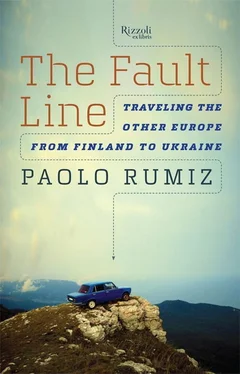Now it’s Leonid’s turn. “Brothers, it’s cold here, but the cold is warmed by our friendship.” Monika translates his words in my ear. She’s happy, too. “Politics keeps running forward without caring for anything. But now we are here among simple people, united by our faith in Christ. So I raise my glass to our guests from far away, knowing that we will carry them in our hearts.” And down goes another glass. Out of the corner of my eye I see Vdovin and his wife beaming with happiness that our meeting has gone so well.
Out come olives, French wine, and Italian Gorgonzola. We eat in noisy good cheer. The three soldiers drink no alcohol, but they drink down our words. I tell them the story of the Triestian who discovered the archipelago of Franz Josef, the last piece of Russian land before the Pole, and that the day of my sixtieth birthday saw the fall of the frontier around Trieste, so I decided then to come up here to the North to find another one.
The smallest of the Rambos is moved. “Sixty? You’re halfway. I wish you a long life and the chance to tell many stories.” As with the Jews, here a hundred twenty years is considered to be the right life span for a patriarch.
I’m feeling so merry that I explain to the pope my pagan theory of hibernation.
The Alpine peoples and those of the North, who from time immemorial have experienced the reawakening of bears at the end of winter, are naturally prone to believe in the truth of resurrection. Even before Christianity. Didn’t the shamans dress as bears?
Another of the Rambos takes a long look, in silence, at the map of the journey. He’s stretched it out on the floor to get an overview of the whole itinerary. He calculates, mutters to himself, and then bursts out: “But you’re crossing Europe vertically?”
“Fantastic!” I say to him. “You’ve given me the title of the story. Vertikalnaya Europa.” And the discovery obliges Batyushka Leonid, already euphoric over the hibernation revelation, to unleash a new toast to the health of Europe and of its hidden soul on the red line of longitude.

4. WHITE SEA
THE MURMANSK–NOVOROSSIYSK TRAIN—twenty-four army-green cars—is rolling south, muffled and soporific, among ice-encrusted lakes and rivers swollen from the thaw. Violent yellow light to one side, the Finnish border to the other, gray sky overhead. Every now and again it snows. I doze off under the gray blanket of the Russian railroads. I can feel the train’s musical score filling up with muted bass notes. Everything becomes syncopated, even my notes on the page. At Olenegorsk, where we boarded, an elegant blond in a forest-green duffle coat (almost the same color as the train) sat superbly erect in the gusts of snow, alone on the bench of platform number two, saying good-bye to a man and crying like Anna Karenina. On the other side of the steam-frosted glass, I watched her disappear on the horizon, still sitting alone on the bench, and her image seemed to embody Russia.
Now the sky has opened up again; a yellow light shines out of the woods and illuminates the whole car, which is thumping rhythmically through the birches with a crisper double beat. On board, it is lethally hot; the passengers doze, chat, and munch without letting so much as a crumb of bread fall to the floor. It’s morning, but all of them, even those who boarded at Olenegorsk like me, have already picked up their fresh sheets from the conductor and made their beds.
Russian trains are an endless eat ’n’ sleep, a long rock-a-bye nap through the forest. The ride can last as long as three days. They travel thousands of miles like an express train but stop every twenty minutes like a narrow-gauge local.
Imagine an interregional from Glasgow to Palermo or a local from Montreal to Miami. If you’re already punch drunk from the sleepless sunlit nights, taking to your bunk is the only way to live through these distances and these Siberian tempos.
I jot down: blouses, froufrou dressing gowns, muscle Ts, leotards, slippers, baby bottles, well-mannered children who play quietly with toy cars and say “ dobry dyen ” (good day) when I pass by. The second-class compartments don’t have doors, but there are no intrusive looks. They all mind their own business, and if a woman has to change her clothes, it is common practice to turn away. There is a solidarity among the passengers that is unthinkable in my country.
Monika moves in this intimate space with an extraordinary delicacy. She doesn’t steal even one snap. Before taking a picture she excuses herself with her eyes, engages in dialogue, smiles, explains who she is. She manages to strike up a relationship in just a few seconds. Then she captures the image of a mother nursing her baby next to the window, of a man stretched out on his bunk reading a book of poems by Osip Mandelshtam, and of a pallid girl combing her waist-length hair, looking sadly out the window. For my part, I’ve got to deal with a fat guy who, while he’s climbing up to the overhead bunk, does a full split in his pajamas, right over my head.
Every car is governed by a uniformed conductor, more often than not a woman. What a waste of personnel, I thought at the beginning, but I soon changed my mind. Our traveling functionary has a million things to do. She gets off the train at every stop and stands on the edge of the platform, welcomes new passengers, notifies those whose stop is coming up, serves hot water from the samovar located at the end of the corridor, checks tickets, keeps the bathroom tidy, hands out mattresses, sheets, pillowcases, and pillows, and helps the handicapped, the elderly, and children. She’s much more than a ticket checker. She’s a shaman who takes you to the mysterious tundra, a dispenser of security, an affectionate and tireless guide. The forests pass, the teakettle grumbles, and she arrives with a fuming glass of tea in a pewter cup-carrier with a drawing of the Smolensk Thunder Tower on the side.
The Imandra station, between a lumberyard and an immense lake. The stopped train snores for two or three minutes. Four wooden houses and, in the distance, white-capped mountains. A dream. Ah, to get off here, alone with a backpack and an inflatable canoe, knock at the door of a house and ask for a bed. Then go off and paddle your way among sandy islands ringed by thin ice toward an infinite horizon of birch trees, go through the passage from the lake to the river and then to another lake, lose yourself in the maze of rivers and lakes, all on the same level. The rivers here have changed direction. They don’t flow north any more but toward the White Sea. They’re swollen and cobalt blue, turn to froth in little rapids, and in the meantime the low light has turned even yellower.
Imandra, what a magnificent name. No roads pass through it. Its only contacts with the world are the train and the ferry. I look for it in the fragment of the guidebook to Scandinavian Russia that I’ve brought with me. Nothing. Not a word about what I’m looking at outside my window. Guidebooks are pages of nothing. Only banalities. Accomplices in the forgottenness that has descended on these territories. They facilitate destruction with their silence. I tear out those few pompous and useless pages, roll them into a ball, and throw it into the waste can.
Yes, it’s better to travel asking information from the people you meet, and maybe the perfect journey would be made blind, without so much as a map. Making your departure just by getting on the first train that’s going your way.
The Arctic Circle meridian is still far away but almost imperceptibly I begin to feel the South. The tundra is thinning out; patches of tender green crop up in the burned brown of the lichens on the granite. The rest is still lakes, forests of naked birches, aquatic labyrinths. My face is glued to the window. I can’t pull myself away from the landscape of the North until Andrei, forty-five, dressed impeccably as a member of an orchestra, wakes me from my spell and asks me about my journey. I tell him about being a war correspondent in the Balkans and Afghanistan, and since he too had gone to Afghanistan twenty-five years before as a soldier, in the region of Kandahar, the question is not long in coming: “What do you do when you’re walking through a village, you see a boy playing in the middle of the street, and then that boy shoots you in the back? Tell me, what do you do to that boy?”
Читать дальше













